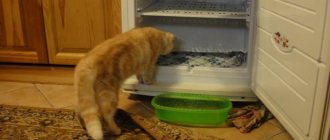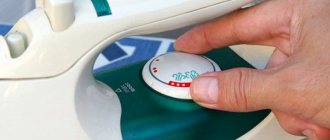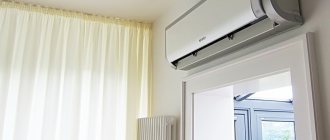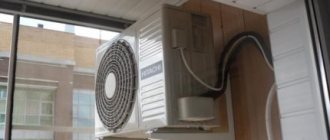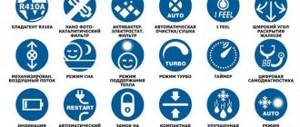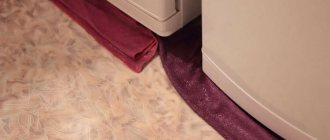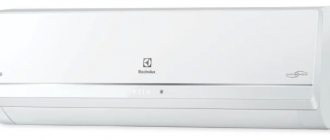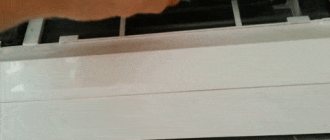Why does water flow
Several breakdowns lead to the disastrous result of the air conditioner leaking. Let's look at each of them:
- In those years when the daytime temperatures do not drop below +30, the cooling system wears out. As a result, the container where the condensate collects becomes overfilled and it flows out.
- Don’t think that problems with a split system can only arise in the summer. Problems also occur during cold weather. During freezing, the heat exchanger becomes covered with ice, causing condensation to appear on the housing. Basically, freezing occurs when there is a significant difference between degrees at night and during the day.
- The reason why water drips from the air conditioner into the room may also be a broken drainage. As a result, condensate flows in, although it should go out.
- A leak may also occur due to the drain hose being positioned incorrectly. Accordingly, the liquid changes direction.
- A depressurized circuit can also result in troubles and additional expenses. The result may be weakened pipes through which the liquid functions within the system. In this case, water will not flow in a stream, but condensation will be visible on the body.
The accumulated condensate is immediately visible Source antares-48.ru
- And finally, the cause of the leak may be increased pressure inside the circuit. This reason is quite serious, and there is no point in trying to deal with it without the necessary tools and knowledge.
See also: Catalog of companies that specialize in engineering systems
Causes of leakage
The drainage is clogged and cannot drain fluid out:
- the entry of insects into the outlet pipe, which are attracted by the coolness of the water during the hot period. They remain there, settling inside the block, preventing the normal outflow of condensate;
- the outlet hose becomes clogged with debris, dirt, dust, animal hair, which gets inside the split system along with the drawn-in air flow. Over time, the remaining dirt accumulates inside the outlet tube, condensed moisture collects in the pan, and then pours out over the edge;
- bacterial contamination of the tank, the entire drainage. If the necessary maintenance is not carried out properly, colonies of bacteria, mold, and mildew begin to multiply in the unit. Microorganisms accumulate inside the system, mucus forms, preventing natural outflow. In addition to the fact that this is dangerous for the health of apartment residents, negative external manifestations arise: an unpleasant odor, water leaking from the air conditioner;
- incorrect placement of the outlet pipe during installation. The hose must be placed at a slope so that the moisture flows out on its own under the influence of gravity. If you place it horizontally, with bends, creases, etc., the condensate will not overcome the obstacles and will accumulate in the pan.
Incorrect, poor-quality installation of a split system:
- the indoor unit is not installed strictly horizontally, as required by the installation instructions. Result: water flows from the air conditioner into the room;
- During installation, elements of the water drainage system were damaged;
- poor-quality flaring of copper pipes contributed to depressurization of the cooling circuit. Freon began to come out and ice began to form on the evaporator. When the ice cover melts, a volume of liquid is formed for which the split drainage is not designed.
Use of climate control equipment during the cold season at low temperatures. If the split system is not designed to operate in cold weather, and a winter heating kit is not installed, the water in the outlet pipe outside will freeze. The ice plug will prevent moisture from draining out.
Features of floor-ceiling air conditioners >>>>
Water flows from the air conditioner into the room - what to do
So, let's look at the causes of leaks from the air conditioner and solutions. Of course, it is best to call a specialist to your home, but you can perform some actions yourself:
- If we are talking about the first reason, then a master may not even be needed here. It is enough to pour out the excess liquid from the drive, insert it into its original position, after which the equipment will work properly again. It is important to turn off the power first. In the future, also do not forget to monitor the slightest leak.
- One of the reasons why the air conditioner leaks is the result of the appearance of ice - it makes sense to make thermal insulation. For example, to avoid temperature changes, you can use glass wool.
- If the cause of the breakdown is the pump, it should be repaired, if possible, or replaced. It is difficult to do this without proper experience, so it is better to turn to the experts.
- If the corrugated hose is positioned incorrectly, it is enough to place it at the correct angle.
- The pipes can be strengthened if it is better to tighten them with nuts and finally use sealant for processing. It is important to act delicately here so as not to break the thread.
Even if the split system has been repaired, do not forget to monitor it so that there are no unnecessary accumulations in it, and in the future it will no longer leak. Prevention is always very important in the case of air conditioners.
Repair of air conditioners in case of leakage in the apartment Source www.stroiword.ru
The air conditioner is leaking: why water drips from the split system and what to do about it
author Administrator Chief
When operating the cooling system, the owner is faced with the problem of water dripping from the indoor unit of the air conditioner. Malfunctions in the operation of equipment are associated with incorrect use and due to breakage or clogging of parts. Let's take a closer look at the following questions:
- reasons why water flows from the indoor unit of the air conditioner;
- what is the “root” of the breakdown;
- Is it possible to independently eliminate the cause of the incorrect operation of the air conditioner and in what cases is it necessary to call a specialist?
Why is water dripping from the indoor unit of the air conditioner?
The first reason is improper operation of the electric air conditioner. The technical product comes complete with detailed instructions for use with instructions from the developers, following which serious problems will not occur in the operation of the air conditioner. An error is a failure to comply with the temperature conditions recommended by the manufacturer. Ratio of indoor and outdoor temperatures:
- In summer, the temperature difference is 5-6
degrees. - When setting for heating, the heating temperature of +30
degrees or higher is set for a short period of time.
If there is a deviation from the norm, the end result is that the equipment cannot cope and begins to produce an excessive amount of condensate.
The second reason is a clogged drain pipe. Debris, dust and insects accumulate in the hose, causing water to leak into the room. At the bottom of the device there is a tray into which condensate drains. The liquid is drained from the pan through a drainage pipe into the street or into the sewer. When clogged, condensate does not drain, but accumulates in the bath, and water from the air conditioner flows into the apartment.
The third reason is installation and installation errors. If, for example, the device is not installed level, the tray is also at an angle. Even with a minimal slope, the water that flows into the drainage hose under the force of gravity begins to drip past the bath, or, due to the slope, flows from the indoor unit onto the floor of the room or onto the wall. Installation errors:
- There is no thermal insulation of wires with freon;
- creases on the tubes;
- incorrect length, angle of inclination of the drainage route;
- the indoor unit is not attached level;
- Freon quantity or type does not match the selected model.
Reason four - freon leak. Freons are used as refrigerants
— fluorine-containing hydrocarbon compounds. Freon absorbs heat during evaporation and releases during condensation, and the condensate flows through the drainage system. If there is a freon leak or a lack of refrigerant, the evaporator of the indoor unit freezes and water flows from the air conditioner.
Determining the cause of water dripping from the air conditioner
- Leak or lack of freon . The metal parts of the device become covered with an ice crust, and during operation the air conditioner begins to “shoot” pieces of ice, while water splashes into the apartment.
- Look at indoor and outdoor
temperatures If the difference is 7-8 degrees in hot weather, then the air conditioner will show dissatisfaction in the form of water dripping onto the floor of the room. When installing equipment for heating, the ratio is also taken into account. Following the operating instructions and setting up air conditioners will extend the life of the equipment. - If water drips from the indoor unit of a new
air conditioner, this is a consequence of
improper installation . In this case, the only advice is not to turn to non-professionals in order to save money. Entrust installation to professional installers. You won't regret it in the future. - When the drainage system is clogged , water flows along the entire perimeter of the indoor unit of the air conditioner and flows into the room.
Cleaning the drainage system
Clearing clogged drain hoses and filters.
Remove the housing and wash the filters located at the front of the split system. Remove the bath and clean the tube located in the corner under the tray. Use a cable wire to “break through the blockage” or blow out the blockage with a vacuum cleaner. Do the work carefully, take your time. It is important not to damage the parts.
To avoid electric shock, unplug the equipment and allow it to cool. After 30-40 minutes, start cleaning. If water does not flow out of the pipe facing the street, we blow out the street pipe. If you can’t do it yourself, contact a professional to remove the blockage.
In other cases, you cannot do without the help of an expert in the maintenance and repair of air conditioners. Don't skimp on equipment maintenance. The result of irrational savings is that you will pay even more for repairs, or resort to buying a new air conditioner.
Source: https://gree-climat.com.ua/blog/potek-kondicioner-pochemu-kapaet-voda-iz-split-sistemy-i-chto-s-etim-delat/
The air conditioner leaked into the apartment - what experts advise
Experts say that the most common cause of a leak is a clogged drainage tank. Therefore, if you do not carry out periodic cleaning, then at some point one of the pipes will simply become clogged. Any debris can get into the tubes, especially in summer, from grass to insects. Some of them, attracted by water, even settle inside the split system. Some owners of this equipment even put a special fine mesh on the end of the outlet pipe, but we should not forget that this too can become clogged over time.
Cleaning the air conditioner if it leaks Source mamamoet.ru
Air conditioner repair prices - why cheap installation is not profitable
Often, the cause of breakdowns due to which water flows inside is cheap and at the same time poor installation. Thanks to it, the causes of malfunctions can be the following:
- The hole made for the tube is not made at an angle, as is customary, but straight, which is why condensation will soon begin to flow inside.
- If low-quality materials were used during the installation process, the tube may break. Also, in a hurry, the master himself can break it.
- Also, poor rolling can lead to a disastrous result, due to which freon leaks, and then, as a result, the heat exchanger freezes. As a result, when the split system is turned on, melted liquid flows and ice falls out.
- The freon line was poorly insulated. This is not only a condensate leak, but also the need for an urgent replacement of freon.
Why is the air conditioner leaking?
One of the most common air conditioner breakdowns is condensate leakage from the air conditioner. Water leaking from under the body of the indoor unit can damage a wall or expensive wallpaper, and if the air conditioner is located above an outlet or household appliances, it can cause a short circuit. There are different reasons, let’s look at them all in order for air conditioners with different drainage systems
Split systems with condensate drainage by gravity
With such a condensate removal system, the liquid, collecting on the evaporator ribs, flows into the bath, from where it flows through the pipeline under the influence of gravity to the street or to the bathroom. In this case, the air conditioner may leak if:
- the drainage pipe is laid without a slope
About 15% in the direction of condensate drainage or the condensate drain hole in the bath turned out to be higher than the other edge from where the overflow occurs
-poor quality materials were used
Over time, the tube becomes kinked or cracked. Or the drainage consists of several tubes connected together, and the joint loses its tightness over time.
- pseudosiphons were used during installation
That is, in order to avoid the entry of odors from the sewer, the waste pipe was bent in a zigzag so that there was a constant column of water that prevents the entry of odors; it is better not to save money and use ordinary siphons, since condensate cannot always push through this column of water
- clogged drainage system
Clogged drain tube, bath or condensate drain hole. In this case, you need to clean the drainage system in any available way (blow, spill, use special chemicals), and disassemble the air conditioner and clean the pan.
Split systems with drainage pump (pump)
Drainage pumps are used if it is impossible to drain condensate to the street (house façade, historically valuable buildings, etc.) or this is technically impossible, for example, the cooled room is below ground level and there is no sewage system or it is impossible to maintain the slope. In this case, the main reasons for condensate leakage from the air conditioner are:
- the drainage (condensate) pump is faulty
Its power has completely burned out or its power has decreased significantly, even if it makes the sound of a running engine, this does not mean that it is pumping out condensate; it needs to be checked.
- the float chamber is clogged
Dirt can clog the float chamber so much that the float is blocked in one position and does not turn on the pump when the water level rises.
- the sensor has failed
Most often, contactless sensors break, but float sensors can also break.
-the air outlet tube is pinched or has come off.
The tube should be reinstalled or released from compression.
-poor contact
On the power terminals of the pump itself or in the connector between the pump and the sensor (float chamber)
-power off
The drainage pump has stopped working, and the evaporator is still cold and condensation is still draining from it. Usually the leak is very small and the problem disappears when the power is turned on.
- freezing of the evaporator of the indoor unit
There is not enough refrigerant in the system and the evaporator temperature is below zero, ice gradually freezes on it and water flows not into the pan, but past it, or onto the fan. In this case, the valves and pipes on the outdoor unit usually also freeze. This can happen not only due to a lack of freon, but also when there is insufficient heat removal from the evaporator, for example, if it is heavily soiled or if the filters are heavily soiled.
-air conditioner operation in winter without pressure regulator
Due to the low temperature outside, the pressure in the system drops, the temperature of the evaporator decreases, even if the amount of freon in it is sufficient and the same thing happens as in the previous case. To eliminate this, it is necessary to install a condensation pressure regulator.
For example, all air conditioners in server rooms are equipped with such devices, with year-round operation.
